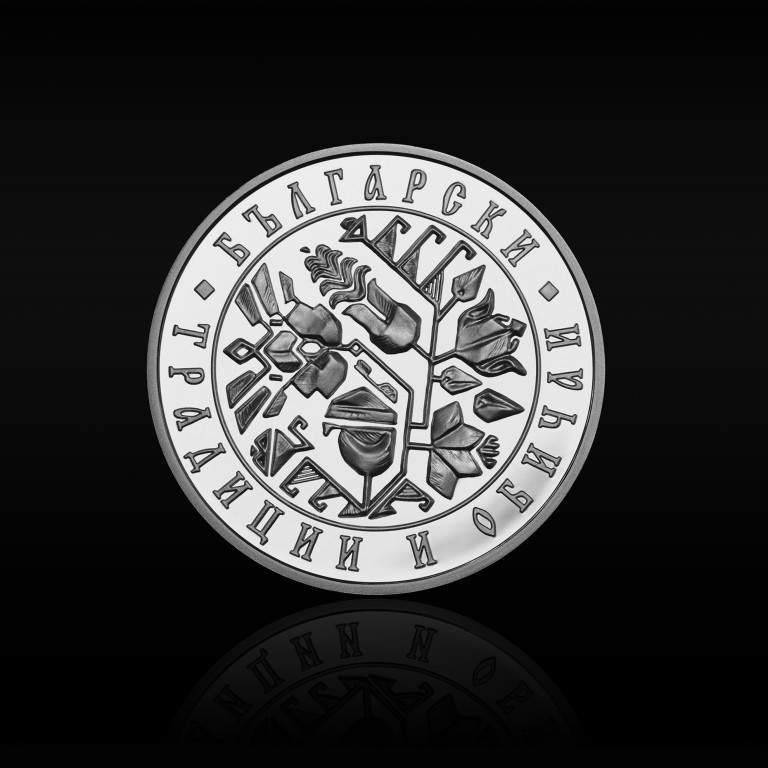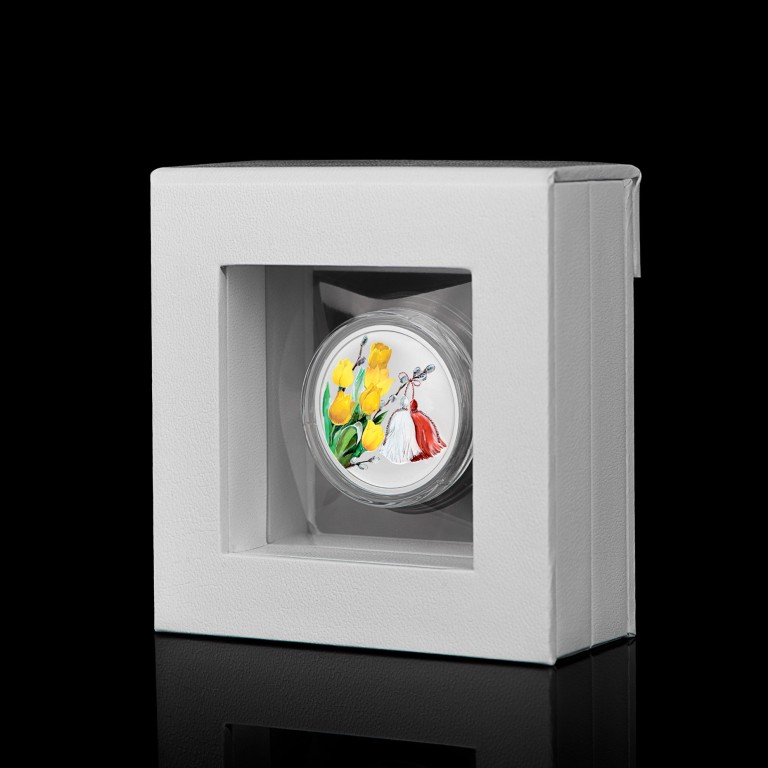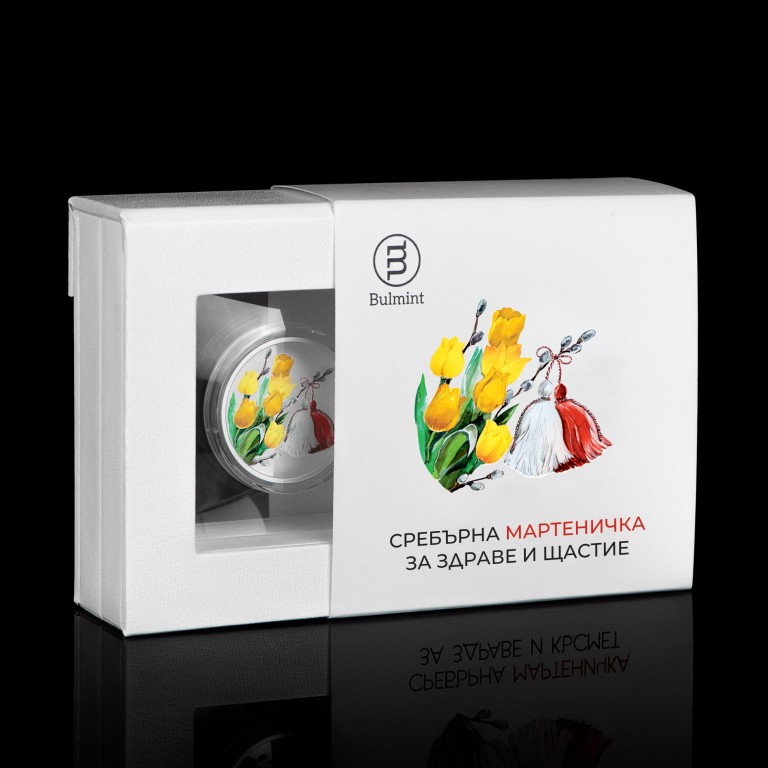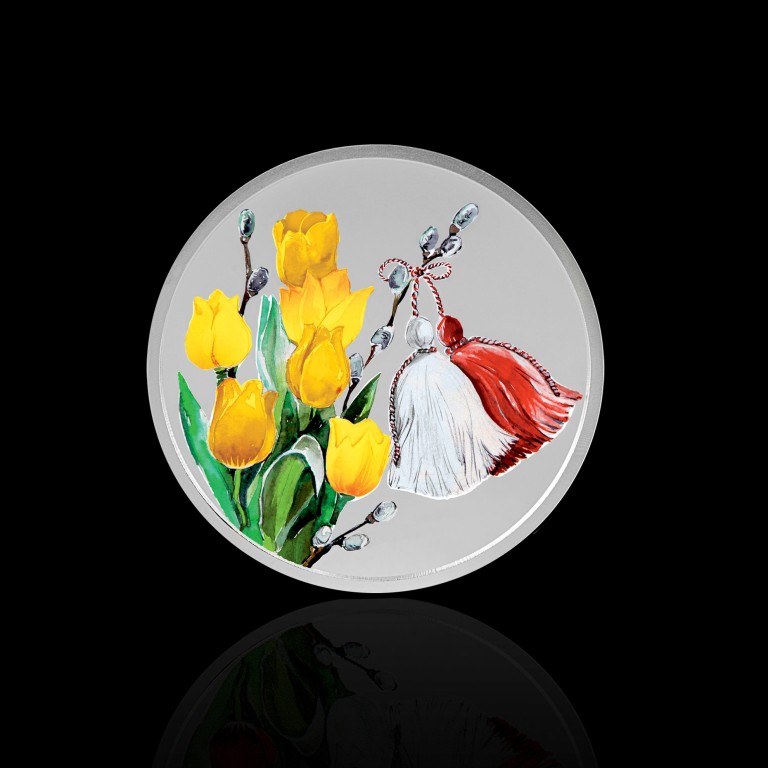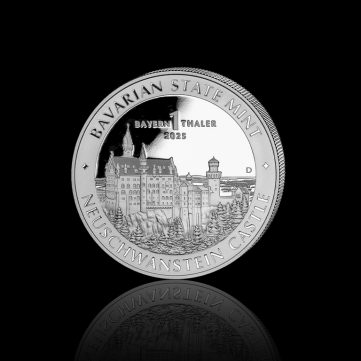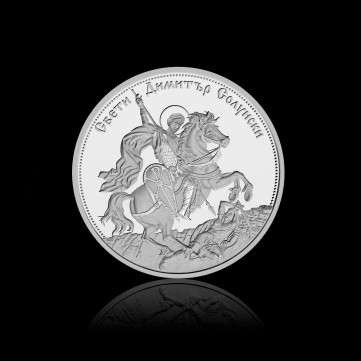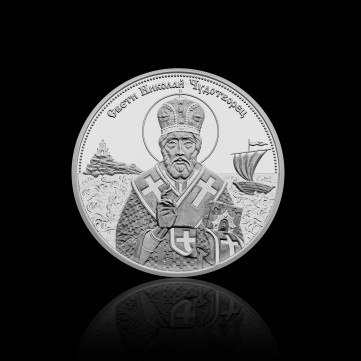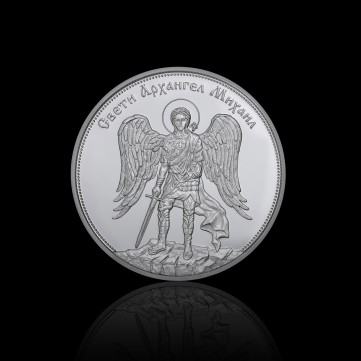The Silver Martenitsa for Health and Happiness, 10g
99.00 BGN / 50,62 €This medal is minted in proof matt-gloss quality out of 999.9/1000 fine silver. The obverse design features March’s signature martenitsa, with yellow tulips as a sunny accent, enhanced through selective digital colorisation. It comes in a luxury medal frame.
The Silver Martenitsa for Health and Happiness medal combines the centuries-old Bulgarian tradition of exchanging martenitsi for good health on March 1st with the symbolism of the sunniest colour. This original gift isбъ minted out of 10 grams of 999.9 fine silver in proof matt-gloss quality, in a diameter of 30 mm. Via selective digital colourisation the obverse design is tinted in white and red, with a yellow accent for an extra dash of spring spirit.
The Silver Martenitsa for Health and Happiness was created as a gift for the Bulgarian holiday of Baba Marta – heartfelt well-wishes forever captured in the timeless nature of pure silver. The motif features March’s signature martenitsa – an amulet of white and red yarn that is said to bring good health and longevity. In Bulgarian tradition, the colour white represents the masculine aspect, and the influence of Christianity has also given it the additional meaning of purity and innocence. The colour red symbolises the feminine aspect, blood, and life. It occupies a place of significance in our culture’s folk art, traditional costumes, and even women’s wedding garbs in the past.
The yellow tulips invoke the refreshing and joyful feelings associated with springtime – and imbue the medal with the additional symbolism of happiness and hope. The medal comes in a luxury white display frame, turning this wish for good health, happiness, luck, and prosperity into a striking tabletop decoration that will bring to the home and office in the years to come.
Metal
Silver
Weight
10
g
Dimensions
30
mm
Purity
999.9/1000
Edging
Smooth
Quality
Proof
Circulation
1000
pcs.
Bulgarian Customs and Traditions Program
The Bulgarian Customs and Traditions program is inspired by the centuries-old customs that have preserved the spirit of the Bulgarian people throughout the centuries. Bulgarian traditional customs are a fascinating mix of Christian beliefs and pagan rituals. The lives of many generations of Bulgarians has historically revolved around the cycles of nature and agriculture.
The Bulgarian Customs and Traditions program comprises several collections dedicated to a variety of emblematic aspects of Bulgarian culture. The obverse design of every medal in this program is enhanced through digital colourisation, which highlights the details of the relief and breathes life into the composition. The colours are natural and vibrant, emphasising the respect for and closeness to nature that is inherent to our traditions. The floral motifs on the reverse sides are a recreation of the traditional hand embroidery of the Samokov area of Bulgaria.
Baba Marta in Bulgaria
(Baba means ‘Grandma’ and Marta means ‘March’)
The celebration of the 1st of March, also known as “Baba Marta”, is one of the most beloved Bulgarian traditions. It is rooted in the distant past and it continues to be celebrated today by Bulgarians all around the world.
According to folk beliefs, Baba Marta represents the sun and spring. She is also the personification of the month of March, locally known as "women's month".
There are many legends associated with Baba Marta’s fickle moods, which are believed to influence the weather. The Bulgarians of old believed that whenever her mood was benevolent and peaceful, so would the days be warm and sunny – but if her mood took a turn for the worse, her dissatisfaction would be felt across the land in the form of frigid winds and heavy clouds. For that reason, the majority of the customs associated with this month have a ritualistic aspect meant to appease Baba Marta. According to folk legends, every year on March 1st she would pay people a visit, clad in a red dress, with red socks and a red scarf – but she would only enter homes that were clean and tidy. In preparation, families would thoroughly clean their homes the day before – a sort of spring cleaning that symbolised them getting rid of all that was old or bad or no longer served them left over from the year before.
Out of all customs practiced on Baba Marta, the most important one is the exchange of hand-woven martenitsi. Martenitsi are made by twisting two strings of white and red yarn together. They re gifted to friends and loved ones, even hung off the collars and harnesses of livestock and pets and hung off fruit trees.
In the past, Bulgarians would wear martenitsi on all parts of the body, including the neck and legs, and sometimes this was even associated with a person's social status. For example, young unmarried girls wore their martenitsi on the left side of their clothes, young bachelors hung them on the little finger of their left hand, and married men put martenitsi in their right sock. Nowadays, they are most commonly worn around the wrist in the form of a bracelet or attached to the person’s shirt. The belief holds that the martenitsa acts as a protective amulet that wards off evil and brings longevity. It is also said to bring good health, good luck and success in the new year. In the old days, Bulgarians believed in the existence of an evil force called "loshotia"(evil) that was said to awaken in the spring - and the martenitsa had the magical power of protecting people from it.
The martenitsa is meant to be worn until the first sight of a stork or swallow. It is removed and placed under a stone. This rite is a form of divination - if there are ants under that rock within a few days, that promises abundance and the birth of many lambs, horses and calves throughout the year. If people want to be rosy-cheeked and healthy, they have to hang their martenitsa on a flowering tree, and if they want to escape from all evil, they have to throw it in running water that will wash away all evil with it.
We ship our orders with Econt Express. The cost of delivery is at the customer's expense and includes insurance, cash on the delivery fee, if applicable, and courier service. The total delivery cost is formed based on the chosen method of payment and the method of delivery.
Orders received by 3 p.m. on working days and chosen payment method cash on delivery or credit card are processed and shipped on the same day. Orders received after 3 p.m. or during the weekend, are processed and despatched on the next working day.
Each shipment has the "Check" option. In case the customer decides to return the order, the delivery and return costs are at the expense of the customer.
Storage of investment products and medals with numismatic value
Owners of gold and silver products with the Bulmint brand should take into account some specific storage conditions. Gold and silver are precious metals, which are very soft and easy to bend/deform. The products must be kept in a place of low humidity where the temperature does not exceed 50 degrees Celsius, in order not to impair the integrity of the package. Please do not use a sharp object on the package or the product itself – you risk damaging it.
Product is out of stock
Enter your e-mail address and we will notify you when the product is back in stock.

